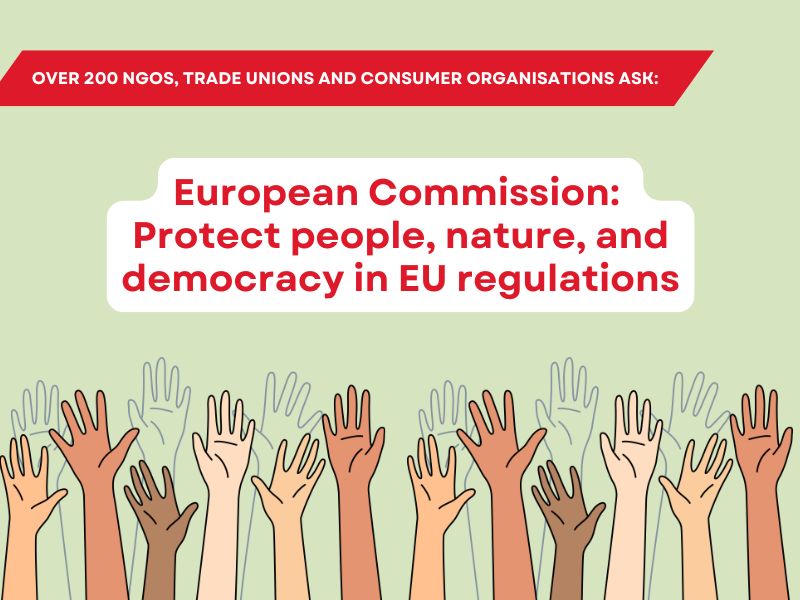
Seven bold actions for an EU Industrial Policy that protects people and planet.
Europe stands at a crossroads with EU institutions either following the path of deregulation by prioritising corporate interests or heading towards a just and sustainable future by putting people and planet at the heart of the economy. It is not too late for the EU to choose an agenda that protects the interests of society.
Our vision for a just and sustainable future
Lawmaking should aim to maximise benefits for society, not minimise costs for businesses. It should focus on responsibility to act, responding to societal, human and wider costs of inaction and not short-term costs of action. Friends of the Earth Europe rejects calls for deregulation, aimed at lowering social and environmental protection and calls for a fundamental shift in EU policy-making. Rules and regulations must not be viewed as ‘red tape’ or ‘bureaucratic burdens’, instead they are necessary safeguards to protect the environment, our climate, people’s health and safety and more in general, the public interest. The European institutions must lead with boldness and integrity, ensuring that EU regulations prioritise public welfare and a liveable planet for future generations over corporate interests.
Our future depends on binding regulations that hold corporations accountable, redistribute wealth and power, and invest in community-led solutions. Protecting human health is central to this vision: ensuring clean air, safe water, nutritious food, and a healthy environment for all. We demand a shift from short-sighted growth, GPD-centred policies to a well-being economy that fosters equity, ecological balance, social dialogue and democratic participation. This is not a patchwork fix. We need system change.
- Reverse the deregulation agenda
- Uphold and strengthen existing regulations that drive a fair, and ecological transformation of our societies and ensure that “simplification” does not prevent, weaken or delay such safeguards.
- Stop initiatives such as ‘one in – one out’ and stress tests of major parts of the EU Laws.
- Guarantee strict enforcement of both existing laws and new EU regulations.
- Don’t make “competitiveness” the primary focus of EU industrial policies
- Strengthening “competitiveness” should not be the overriding objective of EU policies as it will undermine the potential and need for advancing the public interest. Neither should “competitiveness” be used as an argument to deregulate our economy and risk rolling back essential protections.
- Stop listening to corporate lobby groups
- The current “competitiveness” agenda of the EU is a direct result of corporate lobbying. EU policy making must be free of the undue influence of polluting industries by establishing a firewall against toxic lobbying:
- Limiting the interactions with polluting industries, ensuring transparency in any necessary engagements.
- Prevent conflicts of interest, banning revolving doors between industry and government roles.
- Reject partnerships, sponsorships and preferential treatment that compromise public interest policies.
- At the same time public interest groups should have easier access to the decision-making processes.
- Invest in the public interest instead of de-risking private investments
- Public funding should not be provided to corporations with significant shareholder payouts, dividends, and stock buybacks.
- Prioritise investment in sustainable solutions by redirecting public subsidies to support renewable energy, sustainable agriculture, green energy infrastructure, and industries that create quality, climate-friendly jobs.
- Tie all public subsidies and financial support to strict environmental and social criteria, including emissions reductions and ethical labour practices.
- End all subsidies for fossil fuels, polluting industries, and environmentally harmful practices.
- Adopt ambitious climate goals and sufficiency principles
- Propose an action plan to phase out coal by 2030, fossil gas by 2035 and oil by 2040, developing a framework for the decommissioning of fossil fuel infrastructure, and stop promoting and subsidising technologies such as CCS.
- Set ambitious, legally binding targets to reduce resource use.
- Limit sourcing of critical raw materials to sectors vital for human well-being and nature. Stop supporting and engaging with extraction of critical raw materials with severe environmental and human rights impacts and projects that are not supported by local communities.
- Promote fossil-free, zero-pollution industries and products
- A new green industrial policy – as an alternative to the Clean Industrial Deal – must ensure that European industries lead in the transition to a sustainable economic model—one that generates social benefits within planetary boundaries. Shifting away from a carbon- and material-intensive economy and harnessing the benefits of a renewables-based energy system requires collectively restructuring the European economy in the public interest.
- Hold corporations accountable for the full life cycle of their environmental impacts, with mandatory pollution reduction targets and penalties for non-compliance.
- Ban the use of toxic chemicals, reduce pesticide dependence, and promote organic, nature-friendly agricultural practices.
- Strengthen corporate accountability
- Enforce and strengthen EU laws such as the Corporate Sustainability Due Diligence Directive (CS3D). Stop plans to erode these regulations, as the Omnibus law aims to do. Further initiatives should be taken strengthen accountability mechanisms, especially in relation to providing access to courts for affected groups and on binding obligations to reduce climate emissions for companies.
- End global corporate impunity through a binding UN treaty that will hold companies accountable for their social and environmental impacts.
Download the pdf here.
Further reading
https://friendsoftheearth.eu/publication/7-sparks-to-light-a-new-economy/
https://friendsoftheearth.eu/wp-content/uploads/2024/05/FoEE-Demands-EP-Elections-2024.pdf
https://friendsoftheearth.eu/publication/shareholders-over-solutions/
Further reading from other civil society organisations on the topic
https://caneurope.org/content/uploads/2024/11/Joint-statement-social-envi-conditions-CID-Nov2024.pdf
https://caneurope.org/letter-to-the-eu-heads-of-states-clean-industrial-deal/
‘Competitiveness’: inside the troubling corporate blueprint for the coming Commission
https://corporateeurope.org/en/2024/06/prioritise-people-environment
https://corporateeurope.org/en/a-grey-deal
https://eeb.org/wp-content/uploads/2024/09/260924-Industrial-Policy-Position-Paper.pdf

Friends of the Earth Europe gratefully acknowledges financial assistance from the European Commision (LIFE Programme). Views and opinions expressed are however those of the author(s) only and do not necessarily reflect those of the European Union or CINEA. Neither the European Union nor CINEA can be held responsible for them.







